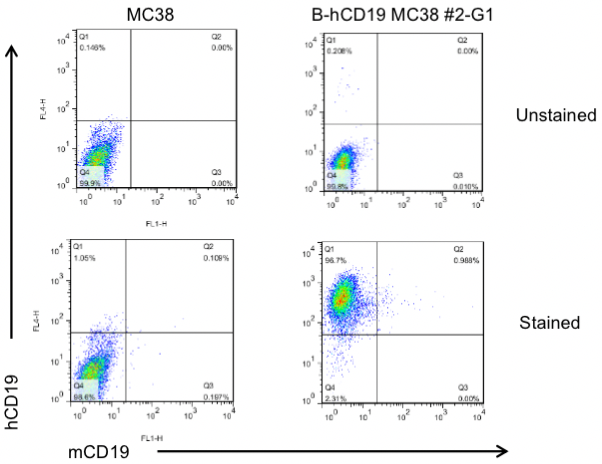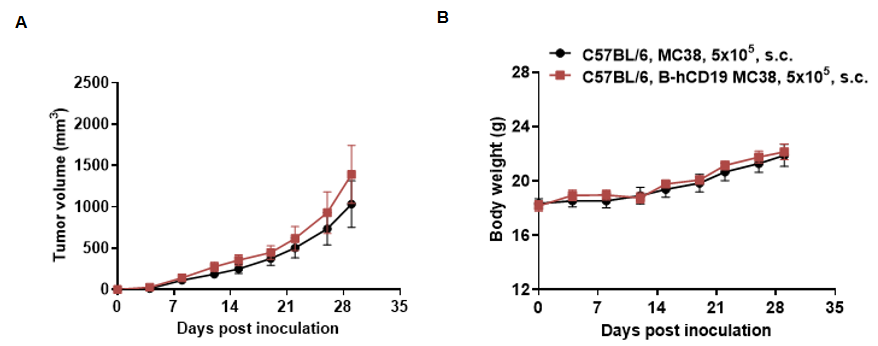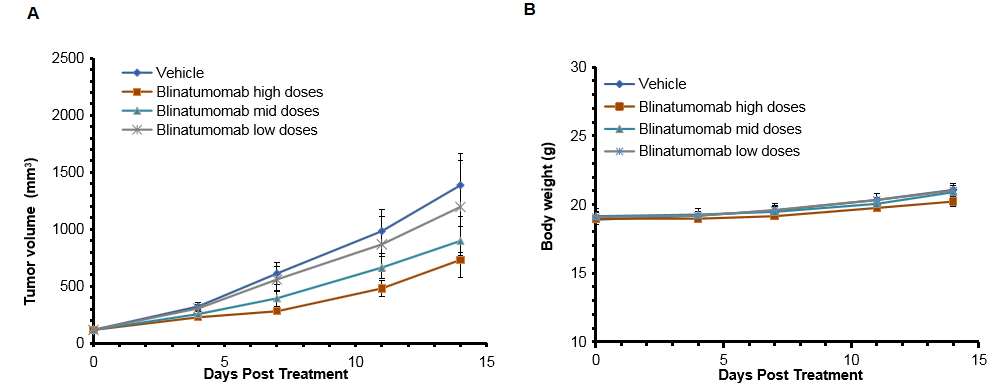B-hCD19 MC38
|
Common name |
B-hCD19 MC38 | Catalog number | 310706 |
| Aliases | CD19, CD19 molecule, B4, CVID3 | Disease | Colon carcinoma |
|
Organism |
Mouse |
Strain | C57BL/6 |
| Tissue types | Colon | Tissue | Colon |
Description
The mouse Cd19 gene was replaced by human CD19 coding sequence in B-hCD19 MC38 cells. Human CD19 is highly expressed on the surface of B-hCD19 MC38 cells.
Application
B-hCD19 MC38 cells have the capability to establish tumors in vivo and can be used for efficacy studies.
Gene targeting strategy for B-hCD19 MC38 cells. The exogenous promoter and human CD19 coding sequence was inserted to replace part of murine exon 2 and all of exons 3~12. The insertion disrupts the endogenous murine Cd19 gene, resulting in a non-functional transcript.

CD19 expression analysis in B-hCD19 MC38 cells by flow cytometry. Single cell suspensions from wild-type MC38 and B-hCD19 MC38 cultures were stained with species-specific anti-CD19 antibody. Human CD19 was detected on the surface of B-hCD19 MC38 cells but not wild-type MC38 cells. The 2-G1 clone of B-hCD19 MC38 cells was used for in vivo experiments.
Tumor growth curve & Body weight changes

Subcutaneous homograft tumor growth of B-hCD19 MC38 cells. B-hCD19 MC38 cells (5x105) and wild-type MC38 cells (5x105) were subcutaneously implanted into C57BL/6 mice (female, n=5). Tumor volume and body weight were measured twice a week. (A) Average tumor volume ± SEM. (B) Body weight (Mean± SEM). Volume was expressed in mm3 using the formula: V=0.5 X long diameter X short diameter2. As shown in panel A, B-hCD19 MC38 cells were able to establish tumors in vivo and can be used for efficacy studies.
CD3e BsAb(Blinatumomab)efficacy

B-hCD19 MC38 cell line was subcutaneously implanted into B-hCD3E mice. Mice were grouped when tumor volume reached approximately 100 mm3, at which time they were treated with Blinatumomab with doses and schedules indicated in panel (B) Body weight changes during treatment. As shown in panel A, high dose of CD3e Bispecific Antibody(Blinatumomab) was efficacious in controlling tumor growth in B-hCD3E mice, demonstrating that the B-hCD19 MC38 were able to establish tumor in vivo and can be used for efficacy study.Values are expressed as mean ± SEM








